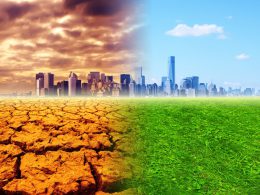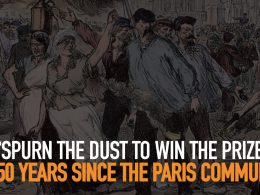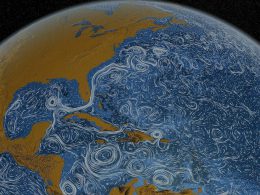By Eddie McCabe
In the midst of the carnage of the First World War, Rosa Luxemburg wrote of the crossroads capitalist society was standing at: “either transition to socialism or regression into barbarism.” This idea resonates profoundly today. What it means is that we need socialism not just because it would be a superior way of organising society to meet the needs of all in a peaceful, equitable and just way; but because any future under capitalism will be catastrophic – unimaginably so.
Nothing demonstrates this more drastically than the ecological crisis, particularly the climate and biodiversity crises. The effects of runaway climate change are already being felt throughout the world, with the global temperature now rising faster than at any point in the planet’s history, resulting in more frequent, unpredictable and severe superstorms, floods, droughts, wildfires and deadly heat waves.
The UN’s target of staying below 1.5° C above pre-industrial levels looks increasingly out of reach, and every fraction of a degree beyond that brings us closer to tipping points in the climate system, which would trigger abrupt and irreversible changes and real devastation. We’re facing – in our lifetimes – large parts of the earth becoming uninhabitable, hundreds of millions of people being displaced and countless species going extinct. All of which will add to the vicious cycle of ecological breakdown that will spiral inexorably towards the destruction of all life as we know it. The prospects really couldn’t be worse.
This is, therefore, undoubtedly the most pressing of the myriad reasons why capitalism has to go. Unfortunately, notwithstanding the essential work of the scientific community, which unanimously agrees about the threat to the planet, its warnings about the problem generally still refer to things like ‘human activity’. But the threat to the environment is not human activity itself, which has coexisted with the natural world for more than 200,000 years (reshaping it for sure but not irreversibly damaging it). More accurately, the threat is human activity as it operates under a capitalist system.
The mass destruction of the environment and the production of unsustainable levels of CO2 emissions date back to the mid-19th century, with the development of industrial capitalism. Although half of all CO2 emissions have been produced since 1990. But all people are not equally responsible. Just 100 major corporations are the source of 71% of all of those emissions. Furthermore, the richest 10% of the world’s population is responsible for 50% of the world’s CO2 emissions, while the poorest 50% (4 billion people) is responsible for just 12%.
Capitalism is a system where the key economic and natural resources are owned and controlled by a tiny minority, and the drive for profit is the motor of economic activity. It is, therefore, an irrational and anarchic system, where competition with rival capitalists creates a dynamic in which all other considerations are necessarily relegated to the rapacious need for short-term profit – to reinvest and expand, lest companies go bust or be swallowed up.
Fundamentally it is a system of exploitation – of both workers and nature. The latter is treated as an inexhaustible source of wealth to be freely exploited. The costs and consequences of depleting natural resources, polluting ecosystems, and disrupting the processes integral to maintaining the biosphere are necessarily disregarded in this profit-making formula. Hence the world’s 60 largest banks have pumped $6.9 trillion into the fossil fuel industry since the Paris Climate Agreement in 2015.
It is of course true that the rapid degradation of the natural world is a threat to all people, including the billionaires and bosses – even if the suffering will overwhelmingly affect the working class and poor. Some of those billionaires and bosses may even be genuinely alarmed and in favour of taking action. However, the capitalist class is constitutionally incapable of acting to avert environmental catastrophe precisely because their system is the problem. The only real solution is to end that system, which means ending their rule as a class of exploiters. This is one thing they won’t let happen.
The type of radical transformation – of production, distribution, consumption, energy, travel – required to achieve a truly sustainable world is inconceivable under the capitalist system. That’s why we need real system change. We need socialism: public ownership, democratic planning, international cooperation and solidarity. And there’s no time to lose, because we now face a future of not just barbarism but our very extinction as a species.












